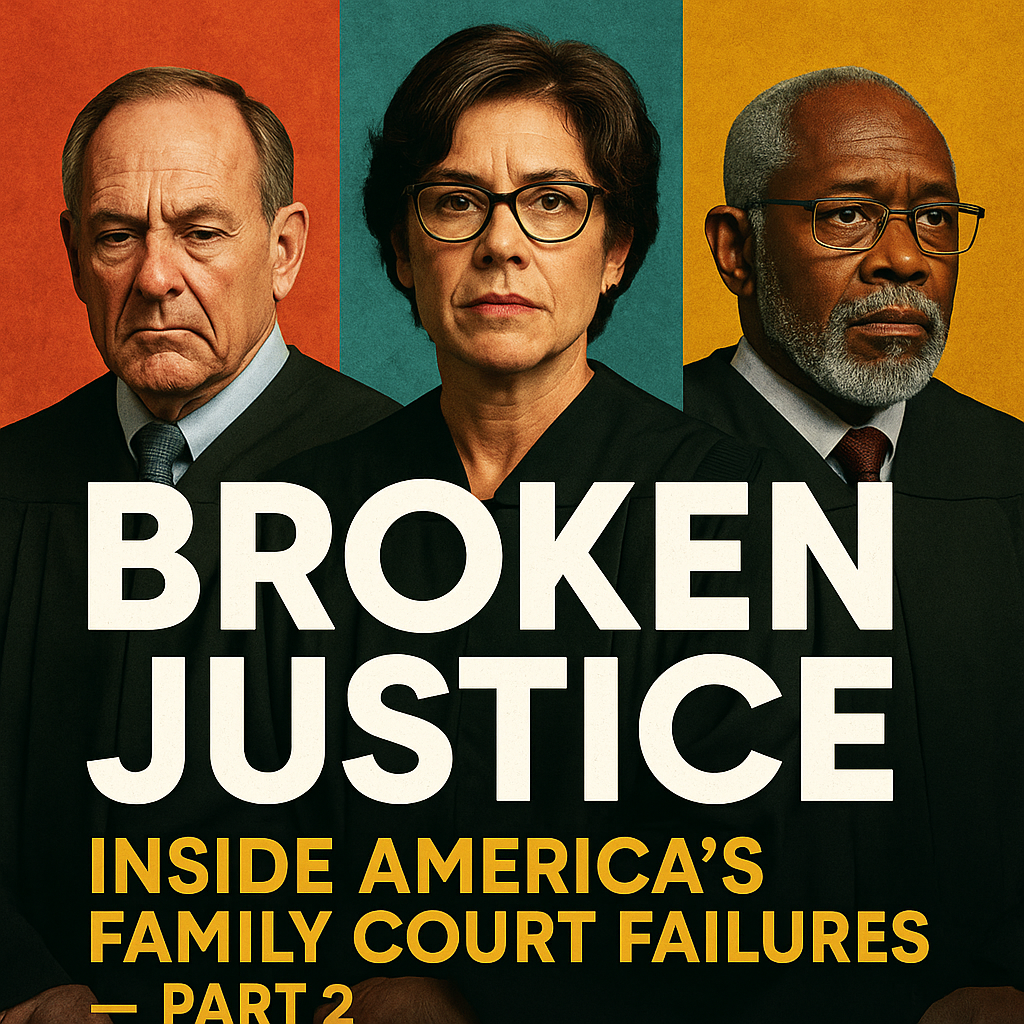
Broken Justice: Inside America’s Family Court Failures — Part 2
Judicial Misconduct and Political Influence
By Yevgen Fromer – Editor, Real Divorce Stories
This investigation uncovers how political favoritism, judicial immunity, and institutional silence enable misconduct in America’s family courts — with devastating consequences for parents and children.
👉 Have you witnessed judicial misconduct? Share your story here.
⚖️ The Hidden Power of Family Court Judges
Unlike criminal courts, family court proceedings are sealed. Judges determine custody, visitation, child protection, and parental rights — often without written opinions or appellate oversight. In this legal vacuum, abuses of power can occur undetected.
According to the Equal Justice Review report by New York’s judiciary, lack of transparency and inconsistent discipline create a “dangerous perception that accountability does not apply to the bench.”
🕵️ Gerald Garson: Bribery Behind the Bench
Brooklyn Supreme Court Justice Gerald P. Garson was convicted in 2007 for accepting cigars, cash, and lavish meals to rig divorce and custody decisions. According to CBS News, undercover footage caught Garson coaching attorneys on how to manipulate proceedings and bypass judicial ethics.
The scheme impacted over 1,000 matrimonial cases. Garson served 30 months in prison before release. Yet it was years before public scrutiny pierced the shield of judicial immunity and insider politics that had protected him.
🔗 Political Corruption in Judicial Appointments
Garson’s seat was arranged by Brooklyn political boss Clarence Norman Jr., who was later convicted of felony misconduct. Norman’s influence over judicial appointments exposed a deeper crisis: judges chosen through patronage rather than merit.
This system — still active in many counties — allows party insiders to handpick judges, regardless of experience or public accountability.
🚨 National Echo: The “Kids for Cash” Scandal
In Pennsylvania, Judges Michael Conahan and Mark Ciavarella were sentenced for sending thousands of juveniles to private detention centers in exchange for bribes. The “Kids for Cash” scandal drew national outrage.
Though a juvenile justice case, the scandal parallels family court failures: closed hearings, unreviewable rulings, and power left unchecked. Conahan and Ciavarella received 17- and 28-year sentences respectively.
🧑⚖️ Judge Richard H. Miller II: Harassment on the Bench
In 2020, Broome County Family Court Judge Richard H. Miller II was removed from office for degrading and sexist conduct toward staff and attorneys. According to WNBF News, Miller repeatedly made hostile remarks, ignored legal standards, and created a toxic courtroom environment.
His removal was affirmed by New York’s highest court. Yet for years, families had no recourse against his behavior — shielded by judicial immunity and silence from court administrators.
🔒 Judicial Immunity: A Legal Fortress
Under Pierson v. Ray (1967), judges are immune from lawsuits related to their official conduct — even in cases of bias, misconduct, or illegality. Critics argue this doctrine makes it nearly impossible for wronged families to obtain redress.
“If a judge denies your rights, ignores evidence, or behaves abusively in court, you can’t sue them,” said one New York family law attorney. “Your only path is a complaint — which often disappears into a black hole.”
🚫 Whistleblower Retaliation: The Samantha Long Case
In a pivotal case, court clerk Samantha Long was fired after cooperating with an investigation into judicial misconduct. The U.S. Second Circuit Court of Appeals recently reinstated her federal lawsuit, acknowledging potential retaliation.
Long’s experience is far from unique. Attorneys, guardians ad litem, and even foster advocates report being sidelined or blacklisted after filing complaints — deterring future whistleblowers from stepping forward.
🧩 The Franklin H. Williams Commission and Reform Efforts
The Franklin H. Williams Judicial Commission has repeatedly urged reforms to improve fairness and equity in New York courts — including:
- Requiring written decisions in custody and abuse hearings
- Public disclosure of judicial discipline outcomes
- Independent community-based oversight panels
Despite these recommendations, implementation has been slow. As one 2024 review put it: “Structural change has been repeatedly promised and persistently deferred.”
📌 Real Stories, Real Consequences
One mother described losing custody in a ten-minute hearing without counsel. “I begged for more time. The judge said, ‘This is in your child’s best interest.’ That was it.” There was no transcript. No written ruling. No appeal.
Another parent said her evidence of abuse was dismissed without review. “They called me alienating,” she said. “I lost my son for protecting him.”
📉 Silence Protects the Powerful
Judges who misbehave are rarely named publicly. They often resign before formal findings. Press releases by the State Commission on Judicial Conduct summarize disciplinary actions, but many cases end without transparency or corrective action.
In contrast, families live with the damage for years: severed relationships, lost time, emotional trauma — and no accountability for those who caused it.
🔁 Internal Links You Might Have Missed
If you missed Part 1 of this series, we explored how secrecy undermines justice inside New York’s family courts. Also read our in-depth piece: Mother Loses Custody After Reporting Abuse — Judge Labels It ‘Parental Alienation’.
✅ The Path Forward: Recommendations
- Limit judicial immunity in misconduct cases
- Mandate written rulings in all contested family matters
- Empower independent complaint review boards with public oversight
- Require transparent judicial appointment processes based on qualifications
- Protect whistleblowers across all levels of the court system
🔚 Conclusion
Family court was designed to protect children and resolve domestic disputes with fairness. But when secrecy, immunity, and politics collide, the result is a system where misconduct flourishes and families pay the price.
True reform will only come when we confront this injustice head-on — by demanding transparency, defending whistleblowers, and holding judges to the same legal standards as everyone else.
👉 Have a story to share? Submit it here.
This article is part of our Broken Justice editorial series. All individuals are presumed innocent until proven guilty. Citations are provided for transparency and accuracy.
